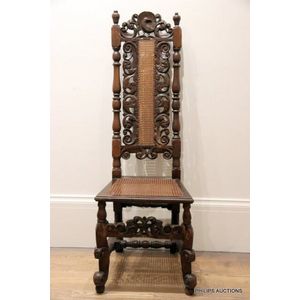William and Mary Walnut Chair with Peacock Carvings
A William and Mary high back walnut chair, circa 1690-1700, with caned seat and back, turned frames with pierced carved insets and an arching crest with carved peacock motif, probable journeyman initials th verso, turned legs with bold scroll designs to front and turned 'H' stretcher, front stretcher with vegetal designs, height 132 cm, width 45 cm, depth 39 cm
You must be a subscriber, and be logged in to view price and dealer details.
Subscribe Now to view actual auction price for this item
When you subscribe, you have the option of setting the currency in which to display prices to $Au, $US, $NZ or Stg.
This item has been sold, and the description, image and price are for reference purposes only.
- Pierced Decoration - Ornamental woodwork with part of the background cut through and removed to produce an open-work pattern.
- Verso - Verso is the "back" side of a sheet of paper, art work, coin or medal. The front side is "recto".
- Circa - A Latin term meaning 'about', often used in the antique trade to give an approximate date for the piece, usually considered to be five years on either side of the circa year. Thus, circa 1900 means the piece was made about 1900, probably between 1895 and 1905. The expression is sometimes abbreviated to c.1900.
- Turned Legs - are legs which have been turned on a lathe. In use from the 16th century, turned legs on tables, chairs and cabinets became more frequent until, by the 1830s, the Georgian square or tapered leg was rarely found except in country pieces.
- Turning - Any part of a piece of furniture that has been turned and shaped with chisels on a lathe. Turned sections include legs, columns, feet, finials, pedestals, stretchers, spindles etc. There have been many varieties and fashions over the centuries: baluster, melon, barley-sugar, bobbin, cotton-reel, rope-twist, and so on. Split turning implies a turned section that has been cut in half lengthwise and applied to a cabinet front as a false decorative support.
- Stretcher - A horizontal rail which connects the legs of stools, chairs, tables and stands, to provide stabilisation of the legs. A stretcher table is any table with a stretcher base. The term is usually applied to substantial farmhouse tables, although many cabinetmaker's pieces, such as sofa tables, also have turned stretchers.
This item has been included into following indexes:
- chairs, singles / pairs / threes, style or period
- chairs, singles / pairs / threes, timber - walnut 705
